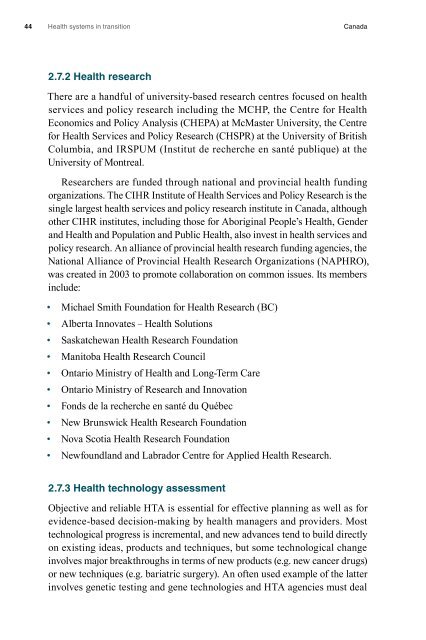Canada - World Health Organization Regional Office for Europe
Canada - World Health Organization Regional Office for Europe
Canada - World Health Organization Regional Office for Europe
Create successful ePaper yourself
Turn your PDF publications into a flip-book with our unique Google optimized e-Paper software.
44<br />
<strong>Health</strong> systems in transition <strong>Canada</strong><br />
2.7.2 <strong>Health</strong> research<br />
There are a handful of university-based research centres focused on health<br />
services and policy research including the MCHP, the Centre <strong>for</strong> <strong>Health</strong><br />
Economics and Policy Analysis (CHEPA) at McMaster University, the Centre<br />
<strong>for</strong> <strong>Health</strong> Services and Policy Research (CHSPR) at the University of British<br />
Columbia, and IRSPUM (Institut de recherche en santé publique) at the<br />
University of Montreal.<br />
Researchers are funded through national and provincial health funding<br />
organizations. The CIHR Institute of <strong>Health</strong> Services and Policy Research is the<br />
single largest health services and policy research institute in <strong>Canada</strong>, although<br />
other CIHR institutes, including those <strong>for</strong> Aboriginal People’s <strong>Health</strong>, Gender<br />
and <strong>Health</strong> and Population and Public <strong>Health</strong>, also invest in health services and<br />
policy research. An alliance of provincial health research funding agencies, the<br />
National Alliance of Provincial <strong>Health</strong> Research <strong>Organization</strong>s (NAPHRO),<br />
was created in 2003 to promote collaboration on common issues. Its members<br />
include:<br />
• Michael Smith Foundation <strong>for</strong> <strong>Health</strong> Research (BC)<br />
• Alberta Innovates – <strong>Health</strong> Solutions<br />
• Saskatchewan <strong>Health</strong> Research Foundation<br />
• Manitoba <strong>Health</strong> Research Council<br />
• Ontario Ministry of <strong>Health</strong> and Long-Term Care<br />
• Ontario Ministry of Research and Innovation<br />
• Fonds de la recherche en santé du Québec<br />
• New Brunswick <strong>Health</strong> Research Foundation<br />
• Nova Scotia <strong>Health</strong> Research Foundation<br />
• Newfoundland and Labrador Centre <strong>for</strong> Applied <strong>Health</strong> Research.<br />
2.7.3 <strong>Health</strong> technology assessment<br />
Objective and reliable HTA is essential <strong>for</strong> effective planning as well as <strong>for</strong><br />
evidence-based decision-making by health managers and providers. Most<br />
technological progress is incremental, and new advances tend to build directly<br />
on existing ideas, products and techniques, but some technological change<br />
involves major breakthroughs in terms of new products (e.g. new cancer drugs)<br />
or new techniques (e.g. bariatric surgery). An often used example of the latter<br />
involves genetic testing and gene technologies and HTA agencies must deal
















